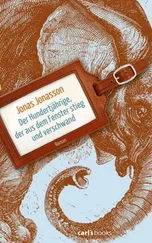*
The line went dead, I thought: The fire department? Why do they need the fire department? Is the car on fire? Do they have to cut him out? My hands turned the key, my foot slammed on the accelerator.
“Woohoo!” shouted the American dad as the train leaped into action.
*
People say that’s not true. Laide had nothing to do with it. Their relationship lasted for a year and when it ended Samuel moved on, it took a month or two but then he started seeing other people and that was really what made him feel desperate, that he realized that it was possible to move on, that none of what had seemed so major was major enough for him to truly remember it, and that was why he aimed for the tree.
*
The train whizzed down toward Katarinavägen, the tires squealed as I skidded onto Hornsgatan, the cars rattled, the wind howled, I just wanted to get there, I had nothing to lose, or what I had to lose was nothing compared to what I risked losing.
*
People say it all hinged on the house. It was those undocumented people’s fault, there were too many of them, it was the smokers’ fault, they threw their cigarette butts on the terrace, it was the neighbor’s fault, he set the fire, it was his family’s fault, they wouldn’t talk about anything but money.
*
The tourists were holding on tight, the children were crying, the pre-recorded guide voice kept speaking as if we were headed back to Skansen. As we passed the pool hall in Zinkensdamm the guide voice said, “To the left we can catch a glimpse of the famous restaurant where the Swedish Academy have their weekly meetings” and as we crossed Ringvägen and were honked at by a bus and passed the Chinese pub that did the Asian buffet the voice said, “After the Swedish Castle you will see the Swedish Government building, or as the Swedes call it: the Riksdag.” As we zoomed out of town across the Liljeholm bridge the voice said, “We are now returning to Östermalm — one of Stockholm’s most affluent areas.”
*
People say that’s a load of crap. It was only one person’s fault, and that person is Vandad.
*
We passed cars on the left, people pointed and laughed, one of the tourists shouted:
“Hello please where are we going please?”
But I thought, to hell with them, I didn’t have time, I just had to get there, it wasn’t too much farther. As we came out of the roundabout in Västberga and passed the industrial area and the gas station I heard the guide voice saying, “Honestly — have you ever seen a more beautiful view? This is why Stockholm is called the Venice of the North.”
*
People say Vandad would do anything for cash. He was emotionally disturbed. He would have sold his own mom for a thousand kronor.
*
As we got closer, I heard sirens and an ambulance sped by in the other direction. There were only fire trucks still at the scene. I was too late. They had had to cut off the roof to get him out, his grandma’s Opel looked like a convertible. I stopped at a distance. The recorded voice was silent, the tourists didn’t know what to do, someone left the train to approach the wrecked car, someone took out a phone and took pictures, someone spoke comfortingly to their children. I wanted to go over there but I couldn’t. From a distance I could see that the car looked pretty okay, except for the skinny tree growing out of the hood. Sure, there was smoke coming from the engine and the windshield wipers were bent out of all shape, but I didn’t want to believe that it was so serious.
*
People say Vandad let Samuel pay for everything. When they moved in together he collected an insane amount of rent just so he wouldn’t have to work. When he took over responsibility for Samuel’s grandma’s house he started extorting money from the people who lived there, he raised the rent every week, he confiscated their passports, he threatened to call the police on those who couldn’t pay.
*
After a while, the guy who had called Panther came up and asked if I was the one he had spoken to. He said that the phone was lying there undamaged and he didn’t know who to call, he just dialed the most recent number. He asked several times how I felt and offered me a ride to the hospital. I didn’t respond, I couldn’t respond, I just kept squatting there and looking down at the grass, there were dirt and ants and a few pinecones farther off, the guy asked again if I was okay, the tourists started going back to the train cars, it was time for me to drive back to Skansen but the guy didn’t want to stop talking, he said he had been a medic in Cambodia and had seen some things. He put his arm around me and said:
“Listen, don’t worry, it’s going to be all right, there there, take it easy, don’t worry.”
It felt good to have his arm there, I felt his warmth, smelled his sweat smell, in the background I heard the guide voice starting over, the actor’s voice welcoming the tourists to this guided tour and when the train was meant to be crossing the Djurgården bridge instead of sitting at the edge of the road in Solberga, the voice said “Stockholm. Look at her. Isn’t she beautiful?”
*
People say that it was because of Vandad that the boy had hidden in the wardrobe.
*
What are you talking about? Who told you that?
*
People say that Samuel’s internal organs were pulverized, his aorta was severed, his heart collapsed, he was crushed by the engine. He died instantly or on the way to the hospital. Because he did die, right? Yes, everyone is in agreement, at least, that he did die. He was born, he lived, he died.
*
Who? I want names.
*
People say that after Samuel’s death, an author started asking questions. He met Samuel’s acquaintances, he said that he had lost someone too and now he wanted to map out what had happened with the people who knew Samuel, he wanted to understand how people had moved on, he wanted to put the feelings of guilt behind him, and every time he heard that it wasn’t planned, that it was only an accident, that Samuel was not at all the type to do something like that and thus he hadn’t done it, the author felt a little better. His feelings of guilt disappeared, he convinced himself that Samuel’s story was his friend’s story, and if the people Samuel knew could move on then he could too. But you can’t move on because deep down you know Samuel’s story isn’t E’s and what might have been an accident was no accident and no matter where you look you see traces of E, in kneecaps, in dimples, in flat rocks, in backseats of cars, in stick shifts, in windshield wipers, in dryers, in laundry rooms, in courtyards, in sunsets, in neon signs, in farewell letters, in regular letters, in missed calls, in unanswered texts, in the name of Grandma’s throat lozenges, in E-major, in em-dashes, in scents, in sugar-free gum, in too-strong perfumes, in water glasses, in jean cuffs, in hoarse laughs, in the backs of park benches, in poached eggs, in American angels, in Berlin dance floors, in Parisian subways, in hotel bars, in made-up constellations, in memories that will soon vanish, in unchanged unending words that can never be erased.
*
They’re lying. Everyone is lying.
*
People say that that’s a lie too, because the author didn’t feel as guilty as he wanted to make it seem. He had other feelings too, he felt furious about being fooled and relieved about avoiding responsibility and happy that his theories checked out because once again here was proof that people could not be trusted, they say they will be there but then they disappear and all that survives is the words and the naïve hope that the next sentence, no the next one, no the next one, will change everything. The crazy thing is that not even his words could be trusted because as he neared the end he realized that every time a hole appeared in Samuel’s story he had used his own memories and it was too late by the time he realized who it was that wrote lists of conversation topics and who collected definitions of love and who panicked over his crappy memory and whose dad had disappeared and whose friend no longer existed.
Читать дальше












